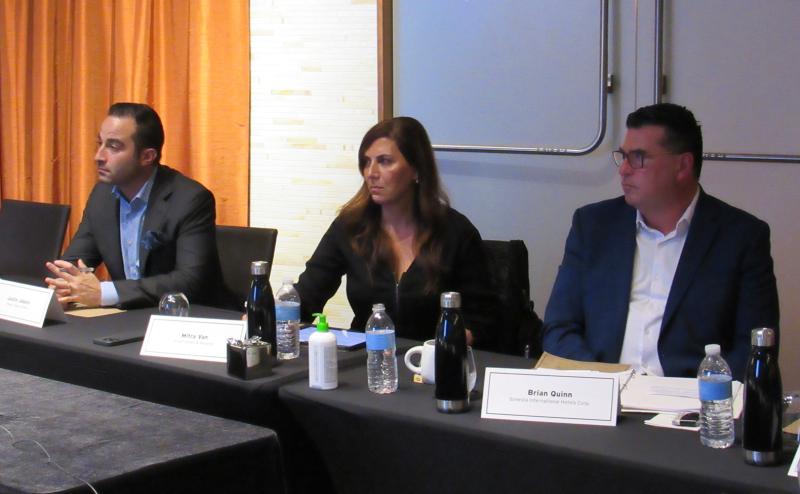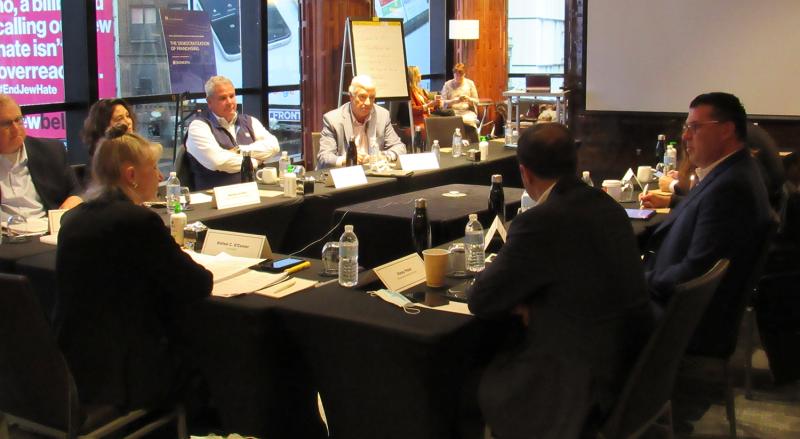A look at the “democratization of franchising” came into sharper focus at Hotel Management’s recent Executive Roundtable sponsored by Sonesta International Hotels Corp. The event, held at the Renaissance New York Times Square, brought together a mix of hospitality movers and shakers who examined the variety of influences driving decision-making in this key industry arena and what the future of franchising may look like.
Coming to grips with the still-fluctuating impact of the coronavirus pandemic, the hospitality industry has been forced to reassess numerous time-honored procedures and models, not the least of which is one of its key pillars: franchising. Long considered an entry point into hospitality for entrepreneurs and investors, the platform is being reinvented now to parlay the pandemic lessons learned, not only by executives on the franchisor side of the equation, but also by their down-in-the-trenches customers, the franchisees. And surprise: Both are finding interacting—and listening—to be mutually beneficial.
“I think understanding where the owners are, the operators are and where they sit today should inform everything that we do as brands, whether it’s implementing this, whether it’s changing prices or strategies, because they’ve been through an incredible trauma,” said Brian Quinn, chief development officer, Sonesta International Hotels Corp. “They’re still stabilizing their businesses and I think the failure to recognize that can get you down a bad path.”
Sonesta itself made sea changes in 2021 around franchising, deciding to franchise four of its seven proprietary brands: Sonesta Hotels & Resorts, Sonesta Select, Sonesta ES and Sonesta Simply Suites. The move looks to bolster its franchise footprint and add to some 900 hotels that came with its $90-million acquisition of RLH Corp. earlier in Q1.
Also crucial to the relationship is to understand where a franchisee is in terms of capital. “A balanced, thoughtful approach as you go back into the market and start to implement some of the more traditional ways that brands and the owners and the operators interact is absolutely critical,” added Quinn.
One panelist with his finger firmly on the pulse of franchisee sentiment was Vinay Patel, president of Fairbrook Hotels and current chairman of AAHOA, where the bulk of its nearly 20,000 members have franchised properties. Traveling the country for the association, Patel said franchisee needs differ, depending on how well or poor a specific market is recovering from the pandemic.
“I think we’re at the point where we’re struggling to make sure we make ends meet,” said Patel, citing the need to acknowledge when a hotel’s operating model has to be reassessed. “We just have to get the dialogue [going] between the brands and ownership and say: ‘Look, guys, this is simply not going to work.’”
New Opportunities
Oddly enough, observed Melinda Griffith, SVP of business development for Concord Hospitality Enterprises Co., even as the pandemic shuttered hotels, plunged healthy 60 percent to 70 percent occupancies to zero, dried up revenue streams and decimated the labor pool, “through this whole time, we’re still developing hotels.”

In “normal” times, this industry basic would hardly cause the type of stress—and opportunity—being found within the “new” normal.
“We have partners and investors with our groups that are anxious,” said Griffith. “…[As] we’re getting close to opening up, they want to sell them. Like right away. ‘Find us a buyer. We want out. This is the time to sell. We don’t want to even open the hotel with you.’”
On the flip side, such quick sell-offs could prove a good market or brand fit for others. “I think there [are] a lot of strange dichotomies that have come out of COVID and where we are today … I think people are just scared; they want to be out. And that’s a great opportunity for others who want to come in,” Griffith said. Many franchisees are taking advantage of the current market, agreed Patel, and they’re getting more than a little push, according to Jeff Kolessar, chief development officer, GF Hotels & Resorts.
“Owners are getting calls from hotel brokers [who are] saying: ‘We’ve got outside investors that want to enter into the States because there’s so much equity and capital out on the streets.’ So, this owner’s saying: ‘Here I am. I’m into a hotel for $125 [grand], I’ve got an offer on the table for $170G. Am I going to worry about the capital-gains issues?’ No,” said Kolessar. But again, agreed the panelists, hotel owners are not going to find such dynamics in every market.
“We always talk about it’s a tale of two markets,” said Tim Marvin, EVP of JLL’s Hotels & Hospitality Group. “There are markets that are severely challenged and it’s difficult to trade right now, because people do not want to take enormous losses on these properties and investors are still not confident in some markets they want to get in.
“But,” he added, “The markets that have proved to be successful, particularly the leisure markets, the coastal resort markets, etc., people get comfortable pretty quickly.”
Meeting Expectations
Sonesta’s Quinn noted that the lingering pandemic is not the only influencer contorting hotel franchisees’ businesses in some markets; shifts in social and cultural paradigms also are in play. “Markets that have all three? It’s brutal,” he contended. That said, Real Hospitality Group, led by President and CEO Ben Seidel, recently opened two franchise brands in such a market: Queens, a borough of New York City. From his perspective, the executive sees the hospitality industry “recovering very much on different sides,” alluding to such basics as brand standards and QA inspections coming back into force, while owners have “had to rethink the [business] model to get [net operating income].”
The group concurred that being innovative around the basics has become the new modus operandi, e.g., learning to live with less, and that all involved in a hotel’s aim for success—the brand, the franchisee, the operators, staff, even the guests—need to listen to each other when it comes to what’s going to work now. Things such as daily housekeeping, expanded complimentary breakfast, amenity packages, plus hard-cost items like signage (which can run into five and six figures), need to be re-evaluated. “I think there’s a place for us to take the hotel P&L as an industry. Brands have a responsibility, the operators have responsibility, the owners do, but let’s rip it apart,” Quinn said.
Giving the guest more leeway to opt in or opt out of a particular hotel offering also will trickle down to the P&L. Justin Jabara, president, Meyer Jabara Hotels, said both before and during the pandemic his company has been innovating around the guest, “looking at what the true net revenue is of a customer,” and particularly how they “consume” across a hotel property’s outlets and services. The all-important guest is central to the dynamic between franchisors and franchisees, and panelists agreed both need to understand how the demographic trend is changing, and along with it, guest expectations.
“You have to know the customer that fits the brand. I think that’s something that we really need to address because the millennials, the Gen Xers, Gen Zs are as old as we are now,” said Griffith.

“We’re so focused on standards, right? Everything is about standards and creating consistency … the younger people don’t want standards, they want customization,” Seidel said. “We should be focusing on processes that lead to consistency to what the guest wants. My point—and I sit on several franchise-advisory boards—is that the standards were written in another day and time.”
“Our owners are bleeding every way possible, so they’re looking for a break. They want an ease on standards,” according to Mitra Van, managing director of Prism Hotels & Resorts, adding the reality of the current situation has to be part of any dialogue. “Then on top of all that, they’re dealing with the labor shortage (and labor law at some unionized properties.)” She noted that $23 an hour was on the table “and we still cannot find a housekeeper.”
Tech Problems
The executives found the lack of labor now also seems toggled to another thorny issue franchisees and franchisors bristle over: the use of technology. Who’s going to foot the bill is usually in contention while overly complicated system platforms seem designed to thwart everyone. Panelists noted that trying to attract a younger, tech-savvy workforce to a tech-lagging industry remains problematic, even minus the pandemic.
“It’s a pain point in recruiting that nobody’s talking about,” Kolessar said.
As a third-generation hotelier, Jabara acknowledged the need for greater technological literacy in hospitality, but stressed that having solid relationships remains key for hoteliers and brands.
JLL’s Marvin agreed. “The most important relationship, we believe, is your relationship with your operator. You have to find an operator that has alignment, that they listen [and] share the same values, because that is going to be your day-to-day relationship. And more often than not—people in a franchise relationship—you need them on your side of the table when you’re dealing with brands,” he said.
As an industry overall, according to Quinn, “We’ve got to figure out tech. We’ve got to figure out the employees. We’ve got to get the value proposition for the consumer right and for the owner right. We [need] to take advantage of what we’ve just been through and rethink signs and breakfast and housekeeping; those are things the consumer’s given us a little bit of running room … because that brings margin back for the operator.”
And while the group felt “listening” is improving, paying attention and acting on what was heard might be even more important. “There’s also what portion of the listening is doing? It’s always a challenge,” said Patel.
